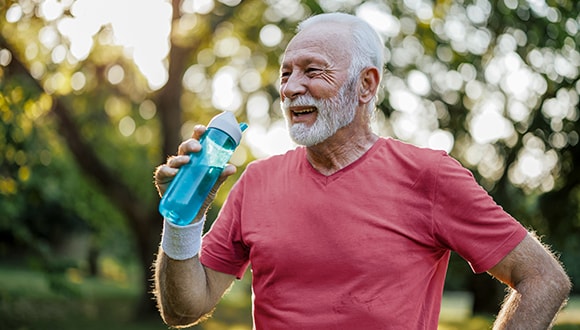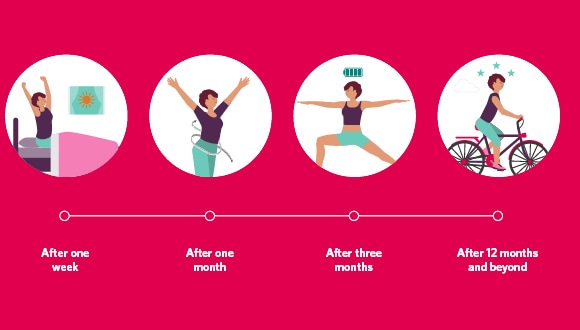The benefits of quitting alcohol for your body and mind
Published July 2024 | 6 min read
Expert contributors Nicole Lee, CEO, Hello Sunday Morning; Dr Erin Lalor, CEO of the Alcohol and Drug Foundation; Dr Michael Livingston, associate professor in the alcohol program at the National Drug Research Institute
Words by Trudie McConnochie
Cutting back on alcohol, or quitting, can be a game-changer for your physical and mental health. Here’s what happens to your body when you quit, and tips on how to do it.
Whether it’s raising a glass in celebration or cracking open a bottle at the end of a stressful day, alcohol has long played a part in the daily lives of many Aussies. But that role is slowly shifting, with around 23% of Aussies not drinking at all, and nearly 40% of 25 to 34 year olds reporting they are drinking less compared to the previous 12 months. Globally, there are currently 79 million posts on TikTok related to ‘sober life’.

But while terms like ‘sober curious’ and ‘alcohol free’ are trending, there are still plenty of people overindulging. The Australian government’s alcohol guidelines say healthy adults should drink no more than 10 standard drinks a week or no more than four drinks on any one day but according to the ABS, more than one in four Aussies exceed that recommendation.
“There’s much more information now around alcohol being unhealthy at any level of drinking,” says Hello Sunday Morning CEO, Nicole Lee. “Even if you keep under the guidelines, there’s still a below one in 100 risk of dying from an alcohol-related disorder.”
Dr Erin Lalor, CEO of the Alcohol and Drug Foundation, says there’s a range of benefits to giving up drinking – and some can be seen within the first few days.
“It’s becoming more common for Australians to reduce, or stop drinking alcohol,” she says. “This might be for health reasons, as part of a lifestyle change, to save money, or just out of curiosity. Whatever the reason, there are lots of benefits to drinking less, including improved sleep, more energy, improved mental health and saving money.”
Here are some of the benefits of quitting alcohol you might notice over the first weeks and months.
After one week
Better energy and sleep are among the first effects you may notice after quitting alcohol. That’s because booze interferes with the sleep cycle, so quitting can help you wake feeling more refreshed.
You may look better, too. With alcohol no longer dehydrating your body, it's likely that your skin may look younger within a week – and your eyes may be clearer, since moderate to heavy alcohol use can cause dry eyes.
After one month
Given that alcohol is high in kilojoules, stops you burning fat and tends to make you crave high-fat, salty foods, quitting may have a positive effect on your waistline. A 2018 review from the UK’s University of Sussex found that people who gave up alcohol for one month reported higher energy levels and a better body weight. Another smaller study found that a month without drinking led to lower blood pressure and better insulin resistance, which is good news for your risk of heart disease and type 2 diabetes.
If you’re a heavy drinker, your gut health could improve around this time, too. Overindulging in booze can disrupt your balance of good gut and bad gut bacteria, but US research shows that after a few weeks of giving up drinking, the gut microbiome of heavy drinkers improved.
And in good news for your relationship, you may notice what seems like a boost in libido. This is because alcohol can affect the sex drive of both women and men, so you may feel like your sex drive has returned once quitting alcohol.
After three months
Your liver should be back to pre-drinking levels of effectiveness by now, having flushed out the build-up of by-products from alcohol, and you may also notice better focus, memory and mental clarity.
And if you live with anxiety or depression, you may find it easier to manage your mental health – research from the National Drug Research Institute (NDRI) found that Australians who reduced their alcohol consumption by 50% reported lower levels of distress.
After 12 months (and beyond)
As well as better focus and mental clarity, you may avoid getting sick more often, since alcohol can affect our gut microbiota, immune system cells and can damage our intestinal walls.
Your long-term health outlook may be more positive, with a decreased likelihood of developing chronic illnesses including heart disease, dementia and cancer.
“There’s a whole range of cancers that are linked to even relatively low levels of alcohol consumption,” says Dr Michael Livingston, associate professor in the alcohol program at the NDRI. “So going from drinking two or three drinks a day to nothing would lower your risk of things like breast cancer and throat cancer significantly.”
How Jaime quit for good
For Jaime Rae, life was all about the weekend. Every Friday and Saturday night was spent at the pub, then a night club until the sun rose the next morning.
“From a young age, my friends and I loved partying,” he says. “But I always had an on-and-off relationship with alcohol.”
Heavily involved in sports, Jaime would abstain from drinking completely while training and competing, but then would let his hair down come off-season, struggling to get control of his drinking.
“I would always get out of hand and there were times where I was a daily drinker, binge drinker or both,” he says. “It’s almost like there were two versions of me.”
Although he tried “febfast”, “Dry July”, “Ocsober”, and felt much happier and heathier during those alcohol-free months, he would always struggle with moderation afterwards. Then he discovered the Daybreak app.
“I created a profile and was astonished by all of the support and encouragement I received from a community of people that were dealing with the exact same issue I was,” he says.
After a few false starts, where he resumed drinking for short periods of time, Jaime quit for good, using the support and resources of the Daybreak community. All HCF members can access Daybreak at no extra cost to their policy.
“It just goes to show that staying alcohol-free is a skill, and like any skill, it must be honed and practised until you eventually get it right!” he says. “Once I admitted to myself that I had a problem and that I needed help, that’s when the path to recovery began.”

How to quit alcohol
If you’re thinking of cutting out – or just cutting back on – alcohol, these tips may help.
- Assess your relationship with alcohol: “A lot of people don’t realise they are drinking more than the guidelines or more than is healthy for them,” notes Nicole. She recommends getting a better picture of your drinking habits using the self-assessment tool on the Hello Sunday Morning website, and using the drink tracker on the Daybreak app.
- Set realistic goals: Starting with short-term goals and progressing to long-term goals can work better for some people, notes Dr Lalor. “For example, some short-term goals might include not having a drink while watching TV after work or delegating a certain number of alcohol-free days each week.” If you’re able to commit to a bigger goal, Dr Livingston says month-long abstinence campaigns like Dry July can be “really effective at helping you reassess the role of alcohol in your life and any thoughtless consumption”.
- Choose a ‘quit date’: After setting your goal, Nicole recommends setting a ‘quit date or a change date’. “Choose the date you will quit and say to yourself, 'right, I'm not going to have a drink from that date onwards’.” She says this ‘line in the sand moment’ can help cement your intentions.
- Change your behaviour: When do you usually drink? If it’s with friends, suggest a different type of activity that doesn’t involve booze, like playing sport or watching a movie. If you usually drink to relax, look for other ways to manage stress, like a warm bath or cooking.
- Switch to low-alcohol or alcohol-free beer, wine and spirits: “Anecdotally, that’s something that people who do drink regularly have talked about as being a really useful way to help them cut back or gain some control,” says Dr Livingston.
- Plan your ‘no’ response for social events: People will likely expect you to drink, so Dr Lalor says it’s important to be prepared when you go out. “It might be as simple as saying ‘no thanks’ or ‘I’m giving my liver a break’ or ‘I have to be up early in the morning, so I better not’,” she says. “Keep a non-alcoholic drink in your hand, as people are less likely to offer you a drink if there is one already in your hand.”
Do you need support?
Dr Livingston’s rule of thumb is if drinking is interfering with your life – e.g. your work or relationships – it’s time to talk to a GP or support service about your drinking.
If you fall into the heavy drinker category or you’re a binge drinker, it’s vital to consult with a health professional before quitting drinking, says Dr Lalor, as it can be dangerous.
Contact the National Alcohol and Other Drug Hotline (1800 250 015) for advice.
Change your relationship with alcohol
Hello Sunday Morning has a mission to change the world’s relationship with alcohol. Its flagship program, Daybreak, is a digital service that you can access through an app on your smartphone. It gives you an anonymous and supportive environment to set alcohol behaviour-change goals and you can track your drinks for personal, financial or health reasons. HCF members may also have access to confidential mental health support on Daybreak. No matter how busy you are or where you live, Daybreak is accessible at any time on a smartphone with no waiting lists, so you can get the support you need, when you need it*.
Related articles
Alcohol and the reward system
For many of us, drinking is seen as a well-earned reward after a tough day. But how can you replace that daily reward with a healthier gratification?
How alcohol affects your sleep
Alcohol and sleep don't mix. Find out what the possible side effects are, how it can impact the quality of your sleep in the long term and other health risks you need to be aware of.
Alcohol and depression in men
The growing link between men, alcohol and mental health is revealing some shocking effects.
Digital health services for members
We’ve joined forces with seven digital health services that provide mental health support to our members and their families in the comfort of their own home.
IMPORTANT INFORMATION
* You should make your own enquiries to determine whether this service is suitable for you. If you decide to use this service, it’ll be on the basis that HCF won’t be responsible, and you won’t hold HCF responsible, for any liability that may arise from that use.
This communication contains information which is copyright to The Hospitals Contribution Fund of Australia Limited (HCF). It should not be copied, disclosed or distributed without the authority of HCF. Except as required by law, HCF does not represent, warrant and/or guarantee that this communication is free from errors, virus, interception or interference. All reasonable efforts have been taken to ensure the accuracy of material contained on this website. It’s not intended that this website be comprehensive or render advice. HCF members should rely on authoritative advice they seek from qualified practitioners in the health and medical fields as the information provided on this website is general information only and may not be suitable to individual circumstances or health needs. Please check with your health professional before making any dietary, medical or other health decisions as a result of reading this website.